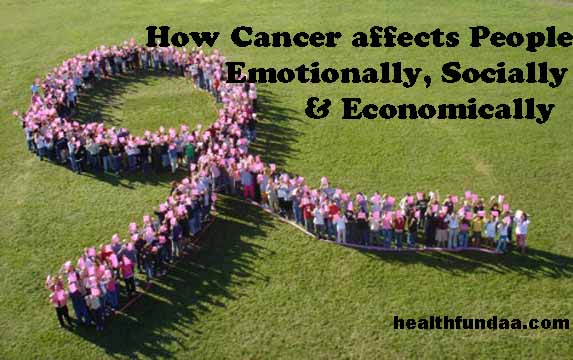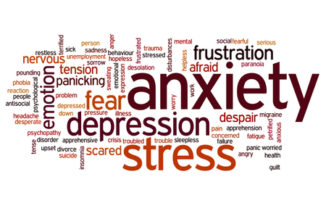Just hearing your doctor say cancer has a deep impact on a person’s life. You feel that your life and your world is shattered.
Doctors and scientists have made significant advancement in the early diagnosis and treatment of many different types of cancers. This has increased life expectancy to the extent that many patients can maintain hope to be cured.
You can get treatment for the physical effects of cancer but what about the emotional problems associated with it? You need to seriously examine the social and psychological damage that the disease can cause.
From the diagnosis to treatment of cancer is a long journey that not only affects a person’s physical health but also his emotional, social and economical well being. Most of the patients also suffer in their relationships with their loved ones. People who experience physical symptoms of cancer such as fatigue, pain and nausea, also experience emotional grief. How long these effects last varies from individual to individual, but they can augment the chances of developing anxiety and depression.
The best thing you can do to improve your quality of life is to learn more about cancer. This will make the disease seem less mysterious and terrifying.
Most of the survivors face social, psychological and emotional problems that can show up even after years of treatment. But the good news is that you don’t have to suffer alone. Various support groups, social media and community resources are available to help you. To help you with your economical or financial problems you can always go for cancer protect plan.
Table of Contents
Emotional, Social & Psychological Effects of Cancer
The first step in coping with emotional, social and psychosocial effects is to realize that you have a problem and have the courage to ask for help.
Here are some of the most common issues that the survivors have to deal with:
-
Body image and self-esteem
Cancer and its treatment generally affect a person’s body’s appearance. The change in physical appearance leads to a lack of self-esteem. A person starts feeling conscious and thinks he is unappealing. This has a great impact on his desire for intimacy with his partner and also in social interaction. Such negative feelings can be minimized by communicating with your loved ones. Also, exercise and a proper diet can help promote better self-image.
-
Fear of recurrence
It is quite normal for cancer survivors to worry about their cancer coming back. Even a small ache becomes a cause of concern for them. They have faced so much that this fear is totally normal and understandable. But at the same time there is a positive side to it as well. This fear motivates them to talk to their doctor about their problems and get to know about the changes in their bodies, which usually people ignore. Regular yoga and meditation can help ease this anxiety.
It is estimated that more than 70% of the cancer survivors suffer from clinical depression at some point or the other in their lives. While tiredness, weight loss and insomnia are minor effects of its treatment, depression is a serious problem. If you feel depressed, don’t hesitate in asking for help. Talk to your family members or friend or a doctor about your sadness that never fades or your lack of desire to participate in activities you once enjoyed.
-
Guilt
Some people feel guilty for surviving cancer while others don’t. If you experience a long-drawn sense of guilt, then your first step is to acknowledge this feeling and understand that it is normal and okay to feel this way. You are not alone, many of them goes through the same feeling. Ask for help from a psychotherapist or support group. They will help you get rid of this guilt.
-
Grief
Grief is a natural outcome of loss. You may feel a sense of loss for how things used to be, or for your health, fertility, physical independence or more. It is important to understand that it is a normal feeling. Recognize it and talk about it to your doctor or counselor or other support groups.
Cancer can have a big impact on your relationships. Your friends, family members and even your colleagues may behave differently with you. They may avoid you or stop talking to you. This is the biggest challenge that cancer survivors have to face. Overcoming communication barriers is very important.
-
Workplace
To re-enter professional life after surviving the disease can be challenging. Your co-workers might feel that they are at a risk of being infected or your bosses may feel a lack of energy in your work performance. However, you should communicate with them and talk about your cancer and its treatment. This can normalize workplace and help you do away with feelings of uncertainty.
On a hopeful note, many cancer survivors feel that life has taken a new meaning after cancer. They find comfort in support groups where they feel that others understand what they have gone through.
Also Read: World Cancer Day 2017: 5 Fitness Activities & Healthy Lifestyle to reduce relapse
Economic Effects of Cancer
Not much has been talked about the relationship between the financial burden of cancer and the emotional health of its survivors.
For a person who is diagnosed with cancer, the financial impact of this diagnosis is quite significant. The financial burden is determined by many factors such as household income, socioeconomic status, insurance status, as well as the extent of disease. Causes of cancer-related financial stress are many. The cost of treatment is large including costs of chemotherapy, radiation, and surgery. People experience loss of productivity at work or total loss of their job. Household expenses may suffer.
A study revealed that patients who are economically affected by cancer are more likely to delay further medical treatment thus putting their physical health in danger.
So what is the solution for this?
The best way to protect yourself from this financial burden is to have a cancer protect plan. It will help you stay financially and psychologically secure in case you are diagnosed with cancer.








